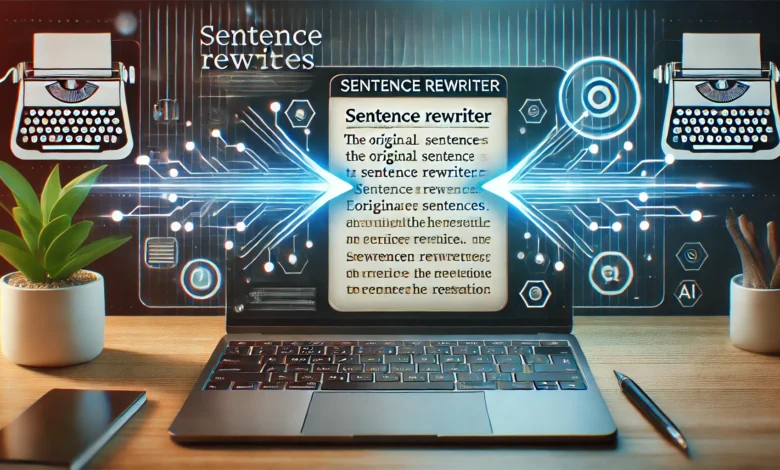Sentence Rewriter: The Ultimate Tool for Clearer, Smarter Writing

Sentence Rewriter Writing is one of those skills that everyone uses but few ever master. Whether you’re drafting an email, creating content for a blog, or writing an academic paper, the words you choose matter. Sometimes, you write something and realize it doesn’t sound quite right—it’s clunky, repetitive, or just doesn’t capture the meaning you want. That’s where a sentence rewriter comes into play. These tools help you reframe your thoughts more clearly, concisely, and in a way that matches your purpose.
In this article, we’ll break down what a sentence rewriter is, why it’s valuable, how it works, and when you should use it. We’ll also look at the benefits and potential pitfalls so you can decide if it’s the right writing companion for you.
What is a Sentence Rewriter?
A sentence rewriter is a tool—often powered by artificial intelligence—that takes a sentence or passage of text and rephrases it while keeping the original meaning intact. The idea is not to change what you’re saying but to improve how you’re saying it.
Think of it like having a skilled editor who can suggest alternative ways to express your ideas. Maybe you want your sentence to sound more professional, simpler, or even more engaging. A sentence rewriter gives you those variations instantly, saving you the time and effort of thinking of alternatives yourself.
Unlike simple thesaurus tools that just swap out words, modern sentence rewriters focus on the structure, tone, and clarity of the text. They make sentences smoother, less repetitive, and often more powerful—qualities that are important whether you’re writing for business, school, or personal projects.
Why People Use Sentence Rewriters

Sentence Rewriter There are plenty of reasons why sentence rewriters have become popular in recent years. For one, writing is hard work. Even experienced writers sometimes get stuck using the same words or sentence structures. Having a tool that can generate fresh options makes the process much easier.
One of the biggest uses for sentence rewriters is in academic writing. Students and researchers often need to explain complex ideas without sounding repetitive. A rewriter helps them find clearer ways to phrase their points, which can improve both readability and originality.
Another common use is in content creation. Bloggers, marketers, and copywriters rely on sentence rewriters to keep their writing engaging. When you’re producing a high volume of content, it’s easy to fall into patterns. A rewriter helps break those habits, ensuring your writing remains varied and interesting to readers.
Finally, sentence rewriters are also useful for non-native English speakers. Writing in a second language can be intimidating, but a rewriter can help smooth out awkward phrasing and make text sound more natural. It’s like having a language coach on demand.
How Does a Sentence Rewriter Work?
Most sentence rewriters use advanced algorithms or AI models to analyze the text you provide. They look at grammar, vocabulary, and syntax to generate new versions of the sentence. Instead of just swapping words, these tools understand the meaning of the sentence and adjust it accordingly.
For example, if you enter the sentence “She quickly ran to the store to buy groceries”, a rewriter might produce:
- “She rushed to the store to pick up groceries.”
- “She went to the store in a hurry to get groceries.”
- “She hurried to the store for some groceries.”
Each version conveys the same idea but with slightly different tones and structures. This flexibility makes a rewriter powerful because it allows you to choose the sentence that best fits your context.
Some tools also allow you to set preferences, such as whether you want the sentence to sound formal, casual, creative, or simplified. This adaptability is especially useful for professionals and students who need to meet specific writing requirements.
Benefits of Using a Sentence Rewriter
The most obvious benefit of a sentence rewriter is time savings. Instead of struggling to come up with alternatives, you can generate multiple options in seconds. This efficiency is especially valuable for writers who deal with deadlines or produce large amounts of content.
Another benefit is improved clarity. Sometimes we write sentences that are grammatically correct but awkward or unclear. A rewriter helps simplify those sentences so readers can easily grasp the meaning. Clarity is essential in all forms of communication—whether it’s business reports, academic essays, or online articles.
Sentence rewriters also support creativity. They provide fresh perspectives that can inspire you to approach your writing differently. Even if you don’t use the exact suggestions, they can spark ideas that make your final draft stronger.
Finally, rewriters help reduce repetition. If you’re writing about the same topic repeatedly, it’s easy to fall into repetitive language. A rewriter ensures your text stays varied and engaging, which is especially important for content meant to attract and retain readers.
Common Misconceptions About Sentence Rewriters
Despite their usefulness, sentence rewriters sometimes get a bad reputation. One misconception is that they’re only used for plagiarism or cutting corners. While some students might misuse them, the real value of rewriters lies in improving expression, not cheating. When used responsibly, they enhance originality rather than diminish it.
Another misconception is that rewriters produce robotic, unnatural text. While early tools had this problem, modern AI-powered rewriters have evolved significantly. They can generate text that sounds natural and human-like, making them suitable for professional contexts.
A final misconception is that relying on a rewriter weakens your writing skills. In reality, using a rewriter can help you learn. By seeing alternative ways of phrasing, you expand your vocabulary and understanding of sentence structures. Over time, this exposure can improve your own writing ability.
When Should You Use a Sentence Rewriter?
A sentence rewriter is not something you need for every single sentence. It’s best used as a tool to refine your writing when you’re stuck, struggling with clarity, or looking for variety.
For example, if you’re working on a blog post and notice that several sentences start the same way, a rewriter can help you mix things up. Similarly, if you’re writing an academic paper and feel your explanation is too complex, the tool can provide simpler alternatives.
It’s also useful for editing. After you’ve written a draft, running certain sections through a sentence rewriter can polish your text and highlight areas that could be stronger. Think of it as a final check that ensures your writing is as effective as possible.
Pitfalls to Avoid
While sentence rewriters are helpful, they’re not foolproof. One pitfall is over-reliance. If you use a rewriter for everything, your writing might lose its unique voice. It’s important to balance tool usage with your own creativity and judgment.
Another pitfall is accuracy. Rewriters sometimes alter the meaning of a sentence slightly. If you’re working on academic or professional content, always double-check to make sure the rewritten version still communicates your intended point.
Finally, avoid using rewriters as a shortcut to avoid learning proper grammar and writing skills. While they’re great aids, strong writing comes from practice. Use them as tools for improvement, not replacements for effort.
The Future of Sentence Rewriting
As AI technology advances, sentence rewriters will only get better. Future tools may integrate seamlessly into writing platforms, offering real-time suggestions that adapt to your tone, audience, and purpose. Instead of being standalone tools, they’ll function like intelligent writing partners.
We may also see more specialized rewriters—tools designed specifically for legal writing, medical research, or marketing. This specialization will make rewriting even more precise and contextually relevant.
In the long run, sentence rewriters won’t replace human writers but will empower them. By handling the repetitive task of rephrasing, they free writers to focus on creativity, strategy, and storytelling.
Conclusion
A sentence rewriter is more than just a tool—it’s a writing companion that helps improve clarity, reduce repetition, and spark creativity. Whether you’re a student, professional, or content creator, it can save you time and help you communicate more effectively.
Like any tool, it should be used thoughtfully. Don’t rely on it entirely, but use it as a way to strengthen your writing and expand your options. With responsible use, a sentence rewriter can make you a more confident and versatile communicator.
As technology continues to evolve, we can expect these tools to become even smarter, more intuitive, and more essential in our everyday writing. For now, they’re already a game-changer—turning ordinary sentences into polished, impactful expressions.



